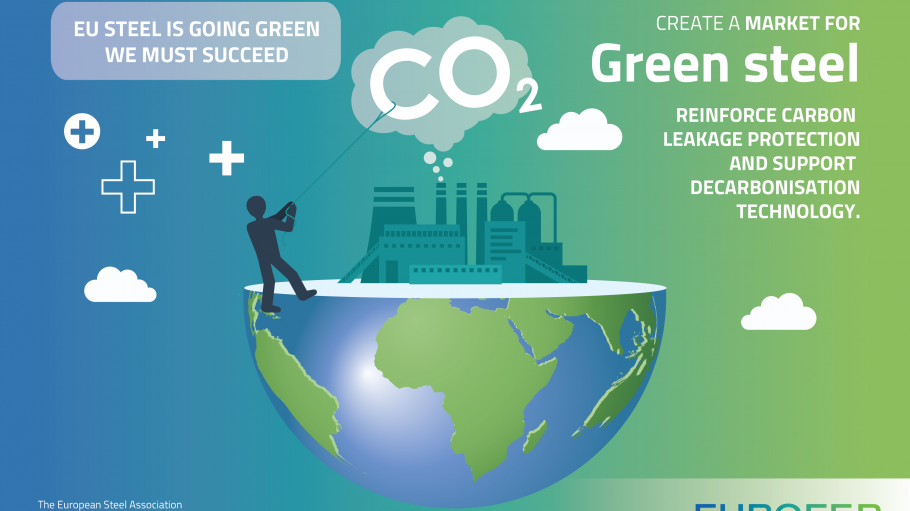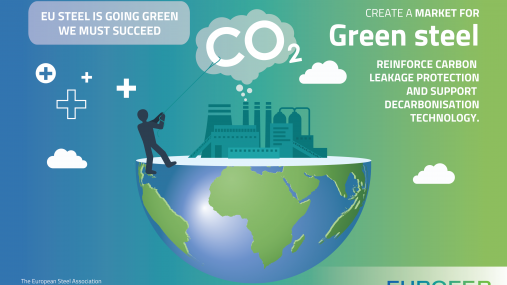
Press releases » Prohibitive energy and carbon prices risk undermining EU steel industry decarbonisation: EU Leaders must act, warns EUROFER
Prohibitive energy and carbon prices risk undermining EU steel industry decarbonisation: EU Leaders must act, warns EUROFER
Downloads and links
Recent updates

Brussels, 16 December 2021 – Continued prohibitive energy prices coupled with skyrocketing carbon prices, above 80 euros, risk derailing the ambitious decarbonisation plans of the steel industry. EU Leaders must act swiftly and ensure climate goals are met cost effectively, while preserving the viability of strategic industrial sectors. This is the warning of the European Steel Association (EUROFER) on the occasion of the European Council and ahead of the Environment Council of next week.
“Key European industries such as steel cannot bear all the energy and climate costs that we experience today and are likely to face also in the coming years if policymakers do not take the right decisions now. The EU needs to pursue its decarbonisation target of a 55% emissions cut by 2030 through a sustainable transition that allows the industry to invest and secure a living for its workforce and the millions of households dependent on it”, said Axel Eggert, Director General of the European Steel Association (EUROFER). “If the transition is not sustainable, we risk that the European market will be flooded by ‘dirty’ cheap steel from third countries such as China, Russia or Indonesia”.
In the last months, energy-intensive companies that are most exposed to price spikes have already been forced to react by curtailing and/or temporarily closing plants. Gas and electricity prices have been rising exponentially, registering 4-to-5-time increases in comparison with last year. In parallel, carbon price spikes up to 80-90 euros have an increasing impact on electricity prices.
“While this unprecedented crisis in the energy markets requires additional urgent initiatives, EU Leaders also need to take into account the implications of the upcoming climate legislation, in particular the Carbon Border Adjustment Mechanism (CBAM) and the revision of the EU ETS”, said Mr Eggert.
According to EUROFER’s impact assessment, the additional direct carbon costs for the steel industry – with the combined effect of CBAM/ETS on the free allocation phase out – will be of nearly 14 billion euros in 2030 with business as usual emissions, or 8,4 billion euros, if the sector is able to reduce its emissions by 30% by 2030 through the proposed 25 billion euros investments in clean technologies.
In practice, this means that in 2030 an average EU steel company retrofitting its plant with clean technology will face 400 million euros carbon costs, while a similar non-EU company exporting its ‘dirty’ steel in the EU market will bear only 30 million euros of costs, despite the CBAM levy at the border.
“This situation would be unsustainable and seriously threatens our low-carbon projects. We ask both the Member States and the European Parliament to reconsider the currently proposed ETS free allocation phasing out in close conjunction with the CBAM on the basis of a more realistic impact assessment, or it will become a Trojan horse for the EU’s very own ambitious decarbonisation objectives. The EU steel industry should become the first industrial mover and the flagship, rather than the collateral damage of the EU climate policy”, concluded Mr Eggert.
Contact
Lucia Sali, Spokesperson and Head of Communications, +32 2 738 79 35, (l.sali@eurofer.eu)
About the European Steel Association (EUROFER)
EUROFER AISBL is located in Brussels and was founded in 1976. It represents the entirety of steel production in the European Union. EUROFER members are steel companies and national steel federations throughout the EU. The major steel companies and national steel federation of Turkey and the United Kingdom are associate members.
The European Steel Association is recorded in the EU transparency register: 93038071152-83.
About the European steel industry
The European steel industry is a world leader in innovation and environmental sustainability. It has a turnover of around €170 billion and directly employs 330,000 highly-skilled people, producing on average 160 million tonnes of steel per year. More than 500 steel production sites across 22 EU Member States provide direct and indirect employment to millions more European citizens. Closely integrated with Europe’s manufacturing and construction industries, steel is the backbone for development, growth and employment in Europe.
Steel is the most versatile industrial material in the world. The thousands of different grades and types of steel developed by the industry make the modern world possible. Steel is 100% recyclable and therefore is a fundamental part of the circular economy. As a basic engineering material, steel is also an essential factor in the development and deployment of innovative, CO2-mitigating technologies, improving resource efficiency and fostering sustainable development in Europe.

Download files or visit links related to this content
Brussels, 22 March 2024 – The future of a strong and resilient EU can only be forged with steel made in Europe. Europe-made low-carbon steel has a strategic role as it enables a net-zero economy, but today it faces strong headwinds from high energy prices, unfair competition, global overcapacity and growing unilateral carbon costs. The year 2023 has recorded the lowest European crude steel production levels ever, with a number of idled plants and dire impact on workers. Ensuring the enabling conditions for the short-term viability and the decarbonisation of the steel sector urgently needs to be at the top of the EU agenda. This is the message delivered by the European Steel Association together with a number of high-level representatives of the sector on the occasion of the Clean Transition Dialogue on Steel in the presence of the Executive Vice Presidents of the European Commission, Maroš Šefčovič and Margrethe Vestager.
Uses, limits, and realistic potentials of demand-side response from the European steel industry along with a broad set of framework recommendations for an EU policy
Antwerp, 20 February 2024 – Today 73 industry leaders spanning almost 20 industrial sectors presented ‘The Antwerp Declaration for a European Industrial Deal’ to Belgian Prime Minister, Alexander De Croo and Commission President, Ursula von der Leyen. The declaration underlines the commitment of industry to Europe and its transformation and outlines urgent industry needs to make Europe competitive, resilient, and sustainable in the face of dire economic conditions.